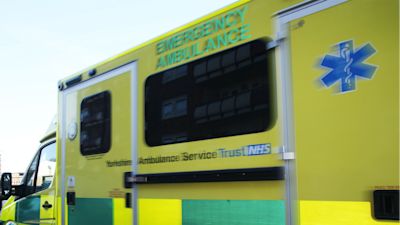Explainer
Ambulance strikes: How will patients in Yorkshire and East Midlands be affected?

Hundreds of ambulance workers in the Calendar region are set to strike in a dispute over pay.
The staff will stage the first of their two walkouts on Wednesday, 21 December, and then again on 28 December.
Paramedics, emergency care assistants, call handlers and other staff will all be walking out as part of the dispute.
How will the strikes affect you?
East Midlands Ambulance Service (EMAS)
Around 2,000 EMAS workers are members of GMB - the union that is preparing to strike in this area.
The Trust said that workers will need to personally make a decision as to whether to take part in strike action or decide to work for the following exemptions.
Ambulance staff may still respond and attend to patients involving:
Immediately life-threatening cases.
Chest pains.
FAST-positive strokes.
Gynaecology emergencies where mother or baby are at risk.
Road traffic collisions where a patient is trapped.
Unwell children aged five and under.
The non-emergency patient transport service in Derbyshire may still be available for:
Patients travelling for renal treatment.
Patients travelling for oncology treatment.
Palliative care patients returning home or travelling to a hospice.
A spokesperson for EMAS said that "patients should only call 999 if there is a risk to life, or if seriously ill or injured".
Yorkshire Ambulance Service
Around 4,000 Yorkshire Ambulance Service staff members belong to GMB and UNISON - the two unions striking in Yorkshire.
This means that up to 60% of workers could walkout, depending on whether they are scheduled to be working on strike days.
GMB union members will strike on 21 and 28 December for 24 hours on each day. UNISON members will also take strike action, but only for 12 hours on 21 December.
A spokesperson for the NHS Trust said that they are urging people to "only dial 999 for life-threatening conditions or injuries".
Nick Smith, executive director of operations at the Trust, said: "Ambulances will still be able to respond during the strike, but this will only be where there is an immediate risk to life.
"Less serious calls will not receive a response for the duration of the strike action and some patients might be asked to make their own way to hospital, where it is safe for them to do so."
The strike is set to come just one day after the Yorkshire Ambulance Service declared a critical incident due to "high levels of demand".
Want a quick and expert briefing on the biggest news stories? Listen to our latest podcasts to find out What You Need To Know.